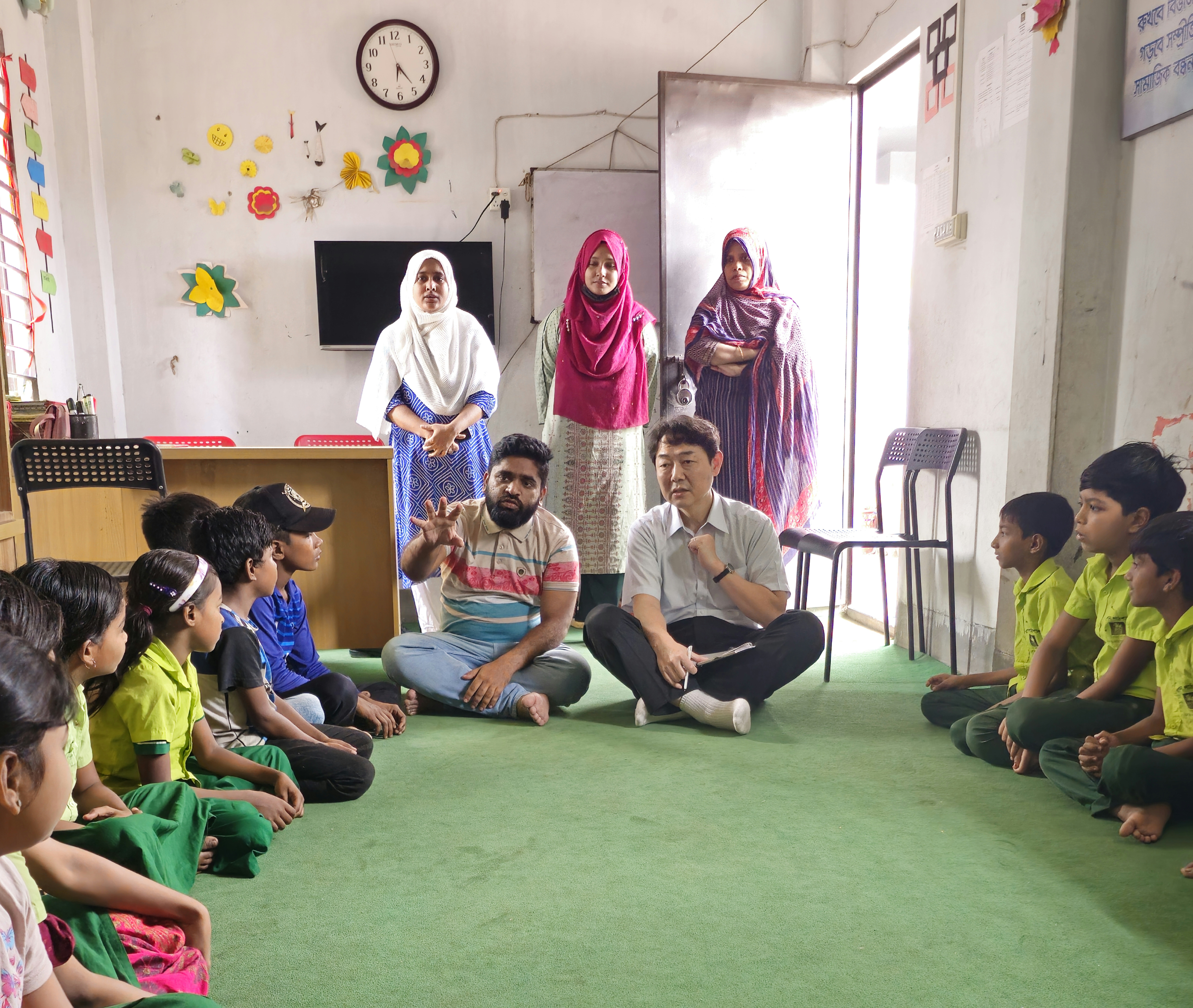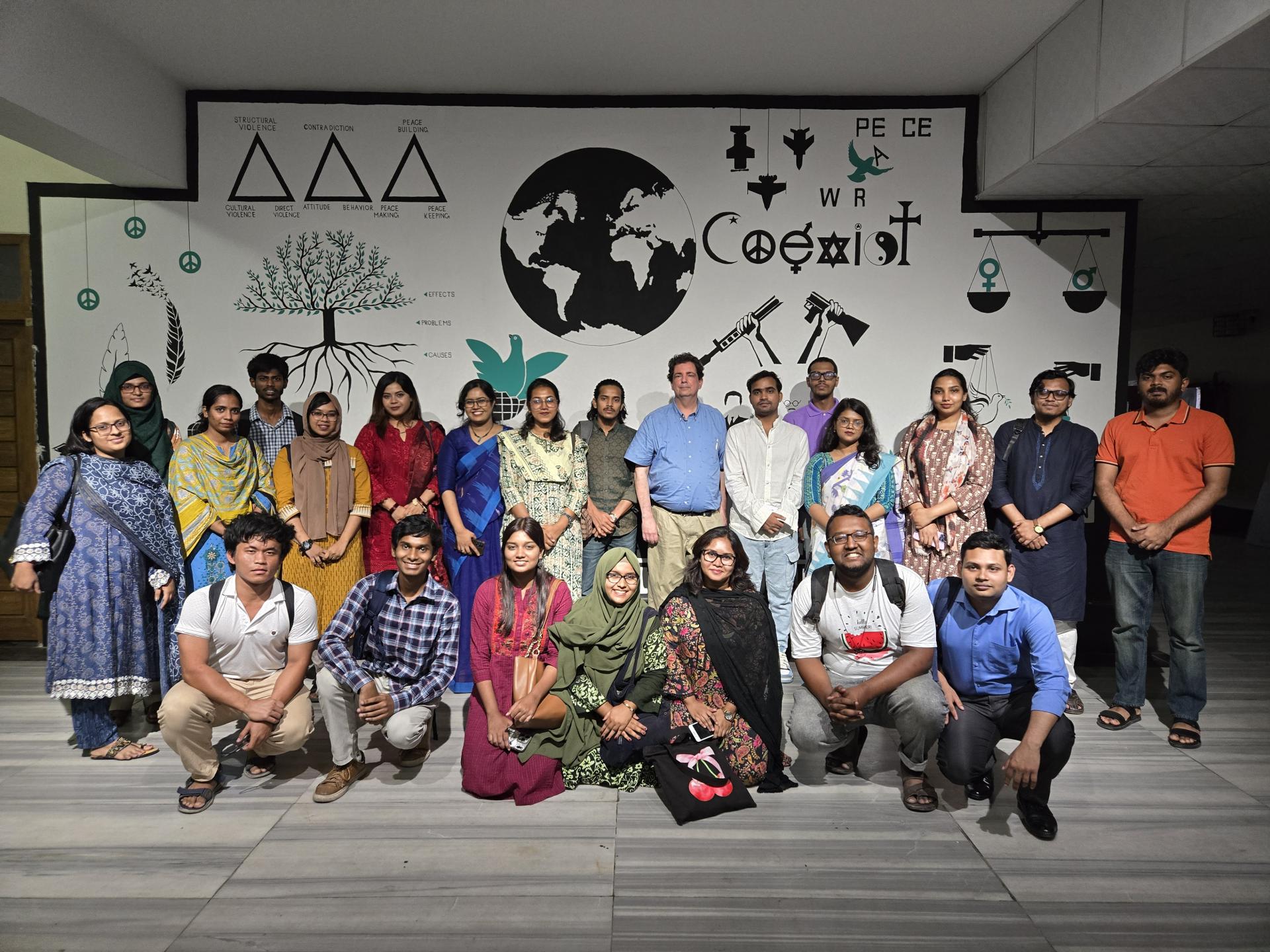With wars raging in Gaza and Ukraine and a tumultuous presidential election cycle, the overthrow of the autocratic government of Bangladesh made few U.S. headlines in 2024.
Yet the ouster of Prime Minister Sheikh Hasina, which followed a student-led mass uprising against her regime in July 2024, caused serious concern among �鶹���� professors from the School of Peace and Conflict Studies. Within months of the July Revolution, two Kent State professors were on the ground in Bangladesh working with the University of Dhaka and exploring ways to support Bangladesh-led efforts to heal from the violence and trauma and chart a path toward genuine democracy.
Peacebuilding is not just a concept that is taught at Kent State; it is something that faculty from the School of Peace and Conflict Studies and their students practice both at home and abroad.

Kent State’s Mission
“�鶹���� and, in particular, the School of Peace and Conflict Studies, has the legacy of May 4, 1970,” said Tatsushi Arai, Ph.D., associate professor in the school and one of two faculty members who have been working with the University of Dhaka in the Bangladesh capital.
On May 4, 1970, the Ohio National Guard fired on Kent State students protesting the escalation of the U.S. involvement in the war in Vietnam, killing four and wounding nine others. The Center for Peaceful Change, which has since evolved into the School of Peace and Conflict Studies, was created in response to the shootings. The school’s peacebuilding work serves as a legacy for the shooting victims and their families and uses Kent State’s unique role in American history as a way to build a more peaceful world.
In the spring of 2025, Arai and Professor Landon Hancock, Ph.D., each made trips to Bangladesh to explore opportunities for building a partnership between the two universities, based on their shared history of student activism for social change. Kent State’s tradition of peacebuilding is rooted in rigorous research, participant-centered education and applied practice in the field, Arai said.
“Our university is well known for student activism and student-led pursuit of social justice, and our school itself is a testament and embodiment of that ongoing legacy that is translated into a continuous effort for research, education, and social outreach for social justice and peacebuilding,” Arai said.

Roots of Revolution
The July Revolution against the Awami League, the sitting government of Bangladesh, was led by students, many from the University of Dhaka, who took to the streets to protest undemocratic policies and practices, including employment discrimination, human rights abuses and rampant corruption.
The cause of the uprising was the 2024 restoration of the decades-old quota system for government employment, originally instituted in the aftermath of the 1971 Bangladesh War of Independence against Pakistan. The system was created to reserve a quota of government jobs for the freedom fighters who had waged the battle for independence, a policy that was later expanded to include their descendants. Over time, though, the system was seen as outmoded and as giving some an unfair advantage in securing government employment.
Following student protests, the government in 2018, announced the removal of the quota system, which took effect in 2020. In 2021, however, that move was challenged by children of the freedom fighters, and in June 2024, Bangladesh’s high court ruled that the quota system would be restored.
Almost immediately, student protests began on university campuses and continued to grow in size and strength until the government moved in to quell the uprisings in what is known as the July Massacre. The government crackdown resulted in the mass killing of many protestors, students, journalists and bystanders.
However, the government’s actions only caused the protests to grow from student-led to a full-fledged anti-government movement that resulted in the resignation of Prime Minister Hasina and her fleeing to India.
Neil Cooper, Ph.D., director of the School of Peace and Conflict Studies"...Our goal in the school is not only to underpin practical work for peaceful change with rigorous scholarship, but to ensure that our scholarship is informed and enhanced by the experience of doing this kind of work in the first place.”
A Shared Commitment to Peaceful Change
Many leaders of the movement were students from the University of Dhaka. Arai said it was a graduate student from Bangladesh who first brought the uprising and the possibility of a partnership to the attention of the Kent State professors.
“They have a department of peace and conflict studies there as well and they were interested in connecting with us based on the shared heritage between May 4 and their movement in the summer of 2024,” Hancock added.
Niaz Ahmed Khan, Ph.D., vice chancellor of the University of Dhaka, expressed an interest in Kent State’s school and how student-led protests became the basis for the school.
Those conversations, Arai said, resulted in the spring visits.
“The University of Dhaka is definitely looking at what kind of peace education is possible under these circumstances,” Arai said. “What kind of research is needed to take stock of the lessons from the July 2024 uprising and how Bangladesh society can overcome the lasting effects of the mass violence, including the trauma.”
During their visits, Arai and Hancock met with students and faculty, and Hancock also met with U.S. Embassy staff in Dhaka. They discussed with university leaders about the types of joint research and educational exchanges that would serve the needs of both universities.
“I met the students, who were fantastic, really bright and really, really dedicated,” Hancock said. “Some of the students had been leaders of the student revolution that toppled the Awami League after 17 years of dictatorship.”

Moving Forward
Arai said he met with some of the most prominent student leaders who helped to galvanize the country through mass mobilization and social media campaigns that spread from university campuses to the public.
Just as the university was the ground zero for organizing the protests, it now serves as a focal point of national attention and discussion regarding how Bangladesh society can foster transitional justice, social healing and democratization to move beyond its destructive past, Arai explained.
He said questions facing the country include how to address the trauma caused by state-sponsored massacres aimed at suppressing the student-led popular uprising.
“These are big issues in Bangladesh society, and the University of Dhaka in particular are grappling with it,” he said. “The sources and effects of the violence, as well as the entrenched systems of injustice and corruption, are so deep-rooted that there should be no false assumption of a quick fix.”
The most important first step, he said, appears to be a concerted effort by the Bangladesh government and civil society to build a national consensus on the need for – and the mutually acceptable approach to – a truth and healing process.
“Such a process,” Arai added, “may, over time, create more favorable conditions for national reconciliation by engaging both the perpetrators and the victims of the violence.”
He said it will ultimately be up to the Bangladeshi people to build and take ownership of the nation’s healing and democratization process. However difficult that process may be, there are positive signs. The interim government, formed in the aftermath of the uprising, has pledged to hold national elections in early 2026 as part of its commitment to democratic reform.

Kent State Partnership
In August, the University of Dhaka and Kent State signed a memorandum of understanding to work toward a formal partnership, providing an “institutional framework for future collaboration,” Arai said. Faculty from the two universities began discussions to identify concrete steps for research and educational exchanges.
Neil Cooper, Ph.D., director of the School of Peace and Conflict Studies, said Kent State’s developing relationship with the University of Dhaka typifies the key work of the school and its faculty.
It reflects the way the school honors its mission to be a living memorial to May 4, and its commitment to partner with overseas universities with similar legacies of student activism for peaceful change.
Cooper said the school’s aim in Bangladesh “is to continue to develop this partnership in ways that are both mutually beneficial and designed to enhance the capacity for peacebuilding among our students and our respective communities.”
The work of Arai and Hancock, he said, exemplifies the priority the school gives to applied work in the field.
“Landon and Tats are not just world-leading scholars in their respective fields, but leading practitioners, committed to working with institutions and communities to foster both mutual learning and practical skills that can support conflict management and peacebuilding,” Cooper said.
Tatsushi Arai, Ph.D., associate professor"Our university is well known for student activism and student-led pursuit of social justice, and our school itself is a testament and embodiment of that ongoing legacy..."
Peacebuilding Across the Globe
The work ongoing in Bangladesh is by no means unique, Cooper said.
“All my colleagues in the School of Peace and Conflict Studies engage in a wide range of practical work with communities and organizations both here in Kent and in numerous places around the world,” he said. “Indeed, our goal in the school is not only to underpin practical work for peaceful change with rigorous scholarship, but to ensure that our scholarship is informed and enhanced by the experience of doing this kind of work in the first place.”
Arai and Hancock’s stays in Bangladesh were not their only missions this year.
Hancock spent time over the summer at Chonnam University in South Korea, which is working with Kent State as part of its recovery from the May 18, 1980, Gwangju Uprising, which began when a group of Chonnam National University students raised their voices to protest the military dictatorship ruling South Korea at the time. Demonstrators were fired upon, killed and tortured by the military government during the 10-day uprising.
In June, Arai was invited to Taiwan to take part in high-level policy discussions, drawing on his 20-year commitment to Taiwan-Mainland China-U.S. dialogues for peacemaking. He also is working in Israel to identify initiatives and platforms that promote Jewish-Palestinian coexistence beyond the ongoing war in Gaza.
While in Bangladesh, Arai, who is an expert in Myanmar issues, also conducted field research into the Rohingya Muslim community that has been forced out of Myanmar and into refugee camps in Bangladesh.
He visited southern Bangladesh, where more than 1 million Rohingya refugees are concentrated, as the refugee issue will also have far-reaching consequences on the stability and security of Bangladesh in the future.
“What I am looking at is collective trauma in society,” he said.
This kind of fieldwork, Cooper emphasized, “not only elevates Kent State as a global peacebuilder but also fulfills our faculty members’ personal dedication to making the world a more peaceful place.”
“Peacebuilding is my life,” Arai said, “I don’t see it as work. It’s not a job.”

